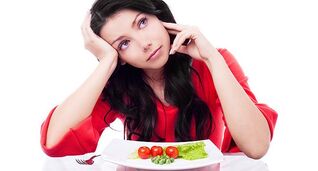Pancreatitis is one of the most serious diseases of the digestive system. Distinguish between acute and chronic pancreatitis, each of these types has its own characteristics and methods of treatment.

Pancreatitis is one of the most serious diseases of the digestive system. Distinguish between acute and chronic pancreatitis, each of these types has its own characteristics and methods of treatment.
But one thing remains unchanged during pancreatitis: the old way of life and the issue of nutrition will be a thing of the past, because the basis of treatment for pancreatitis is diet for almost a lifetime. The pancreas does not forgive eating mistakes, responds immediately with pain and digestion.
Basics of pancreatitis
Pancreatitis is an acquired disease, it develops as a result of abdominal trauma, viral damage to the pancreas, liver and gallbladder disorders, poisoning by alcohol and other toxic substances, frequent and severe eating disorders - prolonged fasting, weight loss for sedentary lifestyles.
The main signs of pancreatitis are:- Abdominal pain - sharp, stabbing, until acute loss of consciousness in acute pancreatitis or dull or painful in the chronic version;
- nausea and vomiting;
- fecal disorders, more often acute diarrhea, fever;
- drastic weight loss.
Acute pancreatitis is usually admitted to the hospital. Chronic exacerbations can be treated at home, but only under the supervision of a doctor. In the case of pancreatitis, self-care is dangerous with the development of complications before pancreatic necrosis (enzymatic melting of glandular tissue, glandular self-healing) and the development of peritonitis, which is fatal.
Nutrition therapy for pancreatitis
Treatment, enzyme and diet therapy for pancreatitis is chosen by the doctor based on the patient's condition and test data. However, the general principles of diet correction always remain the same. They relax digestion and the pancreas, which means they reduce pain and normalize well-being.
In pancreatitis, food is strictly limited - most conventional products require forgetfulness.It is necessary to eat often, about 5-6 times a day - every 2. 5-3 hours, with an 8-hour sleep break. But part of the volume should be small - about 200-250 g, especially for the first time after the aggravation of the disease.
All dishes are mechanically processed - almost all of them are used in puree form. After that, as soon as the inflammation goes out, larger particles appear in the food, but it is necessary to chew the food thoroughly.
Since the whole body suffers from insufficient nutrients supply to pancreatitis,needs to increase the protein component of the diet (meat, fish, dairy products) - on average, 140-150 g of protein per day.
But fats and carbohydrates that significantly aggravate the pancreas are limited to a minimum. About 300 g of carbohydrates per day, fat - no more than 70-80 g.
Products that have a fungal effect - meat and fish broth, cabbage juice and broth - are removed from the diet; In case of an acute pain attack, it is recommended to fast for 1-2 days under medical supervision.
Pancreatitis requires more fluid intake -It is recommended to drink 2 liters of clean water a day, about 2-3 glasses of water every half hour for the whole day.

Naturally, with pancreatitis, you need to completely stop smoking and drinking alcohol. They are the most powerful provocateurs of seizure.
Exclude what?
The list of banned foods will be quite impressive and can be scary from the start. However, without observing these limitations, relief can be expected for a very long time. Gradually, you can gently expand your diet, following the general principles of proper nutrition.
Therefore, during the entire acute period or at the time of exacerbation of the chronic process, it is necessary to exclude:
- Beetroot soup, cabbage soup and borscht, okroshka, soups based on meat, mushroom and fish broth, the broth itself;
- fatty meats - pork, mutton, goose and duck;
- By-products - kidneys, heart, brain, liver;
- fried, smoked, salty and spicy dishes;
- canned food;
- sausages;
- fatty fish (cat, sturgeon, carp); Caviar;
- fat, margarine, mayonnaise;
- fatty milk dishes - cream, sour cream, cumin;
- heart, boiled egg;
- Millet, corn, barley, bean side dishes;
- Cabbage, turnip, radish, radish, rutabaga, eggplant, onion and garlic, sour cream, cucumber, tomato and bell pepper;
- citrus, apples (sour varieties), grapes, pomegranate, blueberries;
- chocolate, canned food;
- Spicy fries, sauces, marinades, vinegar, ketchup;
- All carbonated drinks, even mineral water (you can only do without gas);
- Strong tea and coffee, juices, cocoa;
- All fresh baked goods and confectionery, pancakes, pies, biscuits.
As you can see, the list of restrictions is quite large, but it is only during the acute process. Then you can gradually expand the diet, but annoying and "heavy" dishes should be forgotten almost forever.
What can you eat?
This is the first question that arises after reading the list of prohibitions. Of course, the diet is not very varied, but it aims to keep the pancreas calm and remove inflammation.

Allowed:
- Yesterday's dried bread, crackers;
- Vegetable, noodle soups;
- Steamed meat dishes and poultry - cutlets, meat, rolls, pate, meat puree;
- boiled fish fillets (lean), baked fish, omelets;
- milk, cottage cheese, low-fat and soft cheese, kefir;
- vegetable and butter (porridge) oils;
- Vegetable purees and onions, cooked vegetables;
- Pasta, noodles, cereals - oatmeal, semolina, buckwheat, rice;
- unsweetened baked fruits (pears, apples, peaches, plums);
- compote, jelly, jelly;
- Rose leaf decorations, herbal tea, bran drink.
Of course, the diet is limited, but after consulting your doctor you will gradually expand the menu.
Sample menu
It should be borne in mind that this menu can be used already at home, in case of exacerbation, in the acute stage of pancreatitis is prescribed on an empty stomach and the gradual introduction of food. When compiling a diet, keep in mind: There should be at least five meals that are approximately equal in calorie content and digestive load.
Menu for pancreatitis for 5 days
First day
- Breakfast: mashed potatoes - 100-150 g, 2 croutons of white bread, 200 ml of mineral water (no gas! )
- Second breakfast: steamed chicken cutlet - 100 g, omelette - 100 g, white dried bread - 1 slice, 200 ml of milk (kefir). Lunch: vegetable soup - 200 ml, boiled fish - 100 g, zucchini puree - 100 g, white bread - 1 slice, rose broth - 200 ml, a third of a banana.
- Afternoon breakfast: fruit jelly - 100 g, low-fat cottage cheese - 100 g, mineral water - 200 ml. Dinner: oatmeal - 200 g, pumpkin puree - 100 g, steamed meat - 2 pieces, weak tea with milk, a slice of dark bread.
The second day
- Breakfast: buckwheat porridge -200 gr, 2 croutons of white bread, 200 ml of tea with milk.
- Second breakfast: steamed beef cutlet - 100 g, carrot puree - 200 g, dried white bread - 1 slice, 200 ml dried compote. Lunch: noodle soup - 200 ml, boiled chicken - 100 g, vegetable puree - 100 g, white bread - 1 slice, mineral water - 200 ml, half-baked pear.
- Afternoon breakfast: apple sauce - 200 g, mineral water - 200 ml, biscuits Maria biscuits - 100 gr. Dinner: mashed potatoes - 200 g, low-fat cottage cheese - 100 g, sandwich with cheese (30 g of cheese, a slice of toast), weak tea with milk, a slice of dark bread.
Third Day
- Breakfast: pumpkin and pumpkin puree - 100-150 gr, 2 croutons of white bread, 200 ml of mineral water (no gas!
- Second breakfast: low-fat cottage cheese - 100 g, half-baked pear, white dried bread - 1 slice, 200 ml compote. Lunch: broccoli soup - 200 ml, boiled meat, mashed potatoes - 100 g, puree - 100 g, white bread - 1 slice, chamomile tea - 200 ml.
- Afternoon food: vegetable pot - 200 g, cheese - 50 g, mineral water - 200 ml.
- Dinner: buckwheat porridge - 200 gr, kefir - 200 gr, half a banana, a slice of white bread.
Fourth Day
- Breakfast: mashed potatoes - 100-150 g, 2 croutons of white bread, 200 ml of mineral water (no gas! )
- Second breakfast: rice porridge - 200 g, dried white bread - 1 slice, 200 ml milk (kefir). Lunch: vegetable soup - 200 ml, boiled fish - 100 g, carrot puree - 100 g, white bread - 1 slice, rose broth - 200 ml, a third of a banana.
- Afternoon breakfast: omelet - 100 g, baked sweet apple, mineral water - 200 ml. Dinner: oatmeal - 200 g, pumpkin puree - 100 g, steamed meat - 2 pieces, weak tea with milk, a slice of dark bread.
Fifth day
- Breakfast: oatmeal - 200 g, pumpkin puree - 100 g, steamed meat - 2 pcs. , Weak tea with milk, a slice of dark bread.
- Second breakfast: steamed chicken cutlet - 100 g, omelette - 100 g, white dried bread - 1 slice, 200 ml of milk (kefir). Lunch: pasta soup - 200 ml, steamed fish cutlet - 100 g, pumpkin puree with carrots - 100 g, white bread - 1 piece, rose broth - 200 ml, Maria biscuits - 2 pieces.
- Afternoon breakfast: baked fruit - 100 g, low-fat cottage cheese - 100 g, mineral water - 200 ml.
- Dinner: mashed potatoes - 100-150 g, 2 white bread crackers, 200 ml of mineral water (again! ).
By following your doctor's advice, following a strict diet, and following all prescriptions, relief can be achieved quickly. But a fairly strict diet with a restriction of “heavy” food will last from 3 to 6 months. And then you will constantly need to limit fatty, fried, spices and canned foods.




















